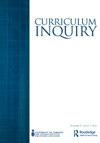Creating space amidst violence
IF 1.6
3区 教育学
Q2 EDUCATION & EDUCATIONAL RESEARCH
引用次数: 0
Abstract
We live in times of compounding crises and ongoing violences. While perhaps not the most violent of times, depending on one’s positionality, context, and circumstances, the impact of the CoVid-19 pandemic along with the dramatic ecological and environmental changes occurring across the globe have in many ways compounded ongoing racial, economic, gender, and colonial violence. in their recently published exchange of letters, Black Canadian author and scholar robyn Maynard and Nishnaabeg cultural worker and scholar leanne Betasamosake Simpson (2022) invite each other— and us as readers—to contemplate what it means to build relationships across differences amidst such violence. in Maynard’s words, “as we are confronted with the crisis of the earth’s viability, then, amidst so many crises, i am writing you so we can think together about what it means for us to build livable lives together in the wreckage” (Maynard & Simpson, 2022, p. 28). the letters between these two influential thinkers inspire us to imagine what it might mean to encounter each other, even if momentarily, to create spaces for joy, generosity, and mutual recognition and uplift which might serve not just as a respite, but as a countermovement against ongoing violence. the kind of exchange that Maynard and Simpson (2022) exemplify as necessary for constituting a liveable present and imagining a future is antithetical to the hierarchical structuring of educational institutions like schools. Maynard and Simpson encounter each other as equals, not in the sense that they are the same or share the same experiences, but rather that they stand on equal footing across differences. this encounter acknowledges these differences and recognizes them as a source of strength that animates the possibilities for a future. in stark contrast, educational processes across colonial and racist institutions like schools are organized by a specific hierarchization of social and cultural differences that produces violence. and yet, as the authors in this issue of Curriculum Inquiry illustrate, these hierarchies and violences are not overdetermined. instead, as educators, we can seek to create liminal moments when schooling structures can be momentarily suspended and opportunities for encounters amongst equals, through which we recognize each other across and within differences, are possible. the ways authors in this issue approach curriculum and pedagogy offer opportunities to wrestle with the contradictions we live within by opening ourselves up to the liminal spaces of our present situation. as James在暴力中创造空间
我们生活在一个危机加剧、暴力持续的时代。虽然这可能不是最暴力的时期,但取决于个人所处的位置、背景和环境,但2019冠状病毒病大流行的影响以及全球范围内发生的剧烈生态和环境变化,在许多方面加剧了持续的种族、经济、性别和殖民暴力。在他们最近发表的书信交流中,加拿大黑人作家兼学者罗宾·梅纳德和纳什堡文化工作者兼学者琳娜·比塔萨莫萨克·辛普森(2022)邀请彼此——以及我们作为读者——思考在这种暴力中建立跨越差异的关系意味着什么。用梅纳德的话来说,“当我们面临地球生存能力的危机时,那么,在如此多的危机中,我给你写信是为了让我们一起思考,在废墟中共同建立宜居的生活对我们意味着什么”(梅纳德和辛普森,2022年,第28页)。这两位有影响力的思想家之间的信件激励我们去想象相遇意味着什么,即使是短暂的相遇,也可以为快乐、慷慨、相互认可和提升创造空间,这不仅可以作为一种喘息,而且可以作为一种对抗持续暴力的运动。梅纳德和辛普森(2022)举例说明,这种交流对于构建一个宜居的现在和想象一个未来是必要的,这与学校等教育机构的等级结构是对立的。梅纳德和辛普森以平等的身份相遇,并不是说他们是相同的或分享相同的经历,而是说他们在差异中站在平等的基础上。这次会面承认这些差异,并承认它们是一种力量的源泉,为未来的可能性注入活力。与此形成鲜明对比的是,学校等殖民和种族主义机构的教育过程是由产生暴力的社会和文化差异的特定等级组织起来的。然而,正如本期《课程探究》的作者所阐述的那样,这些等级和暴力并不是过度决定的。相反,作为教育工作者,我们可以寻求创造一个有限的时刻,在这个时刻,学校结构可以暂时暂停,平等的人之间有机会相遇,通过这种机会,我们可以在差异中认识到彼此。本期作者对待课程和教育学的方式,为我们提供了一个机会,通过向我们目前处境的有限空间开放自己,来与我们生活在其中的矛盾作斗争。正如詹姆斯
本文章由计算机程序翻译,如有差异,请以英文原文为准。
求助全文
约1分钟内获得全文
求助全文
来源期刊

Curriculum Inquiry
EDUCATION & EDUCATIONAL RESEARCH-
CiteScore
3.10
自引率
17.60%
发文量
37
期刊介绍:
Curriculum Inquiry is dedicated to the study of educational research, development, evaluation, and theory. This leading international journal brings together influential academics and researchers from a variety of disciplines around the world to provide expert commentary and lively debate. Articles explore important ideas, issues, trends, and problems in education, and each issue also includes provocative and critically analytical editorials covering topics such as curriculum development, educational policy, and teacher education.
 求助内容:
求助内容: 应助结果提醒方式:
应助结果提醒方式:


